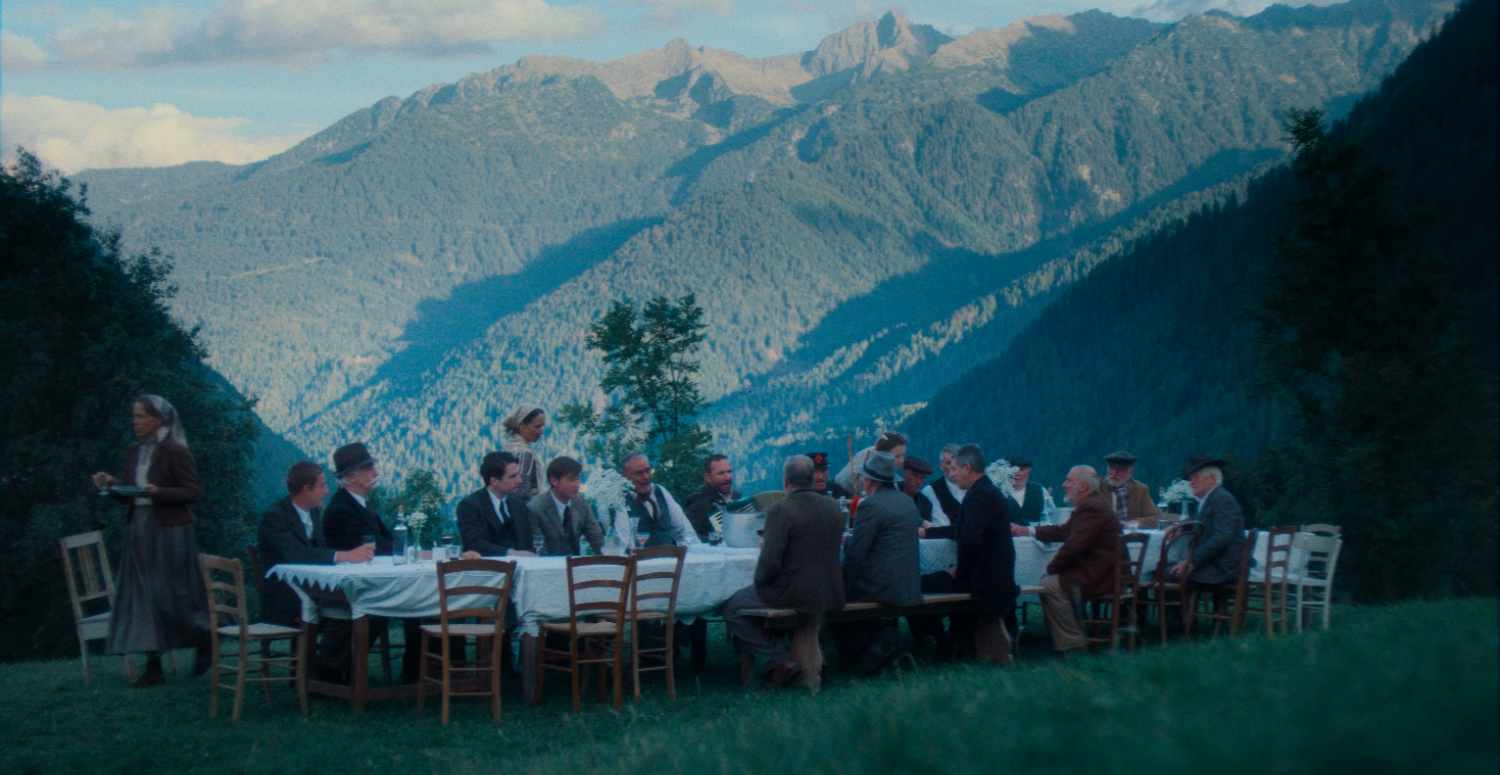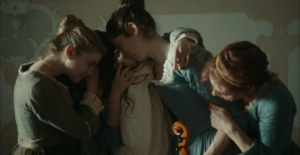Vermiglio
ou la Mariée des Montagnes
Vermiglio / Verméi
Best Film – Italia
Best Director & Best Original Screenplay – Italia
Best Production & Best Casting – Italia
Best Cinematography & Best Sound – Italia
2024/2025

FR EN
Vermiglio, c’est un village au bout d’une vallée, au bout de l’Italie, au bout du monde. C’est aussi le village d’enfance de la réalisatrice Maura Delpero qui a décidé d’en faire un film suite au décès puis à l’apparition en rêve de son défunt père, instituteur. De là est né un long-métrage à la fois personnel, historique et naturaliste, pastoral et miséreux, envoûtant et désenchanté, beau et tourmenté.
En pleine Seconde guerre mondiale, pourtant éloignées de tout, la petite communauté du Trentin et en particulier la nombreuse famille Graziadei sont silencieusement meurtries par les bouleversements du conflit. Cette relative paix est alors légèrement perturbée par l’arrivée de Pietro, un soldat sicilien dont va s’éprendre Lucia, la fille aînée des Graziadei.
Or « Vermiglio » ne s’arrête pas à ce simple résumé. À travers plusieurs sous-intrigues du clan Graziadei entremêlées à la manière de chroniques de la vie montagnarde, le long-métrage explore en effet une multitude de thématiques prises sur le vif, comme une photographie d’époque. Outre l’évident et ambigu décalage entre ruralité et modernité, le film raconte l’histoire d’idéaux brisés par les carcans familiaux, patriarcaux et sociétaux. D’abord celui de l’amour le plus pur, ardent puis brutalement détruit, qu’éprouve Lucia pour son Pietro. Il y a ce désir souvent interdit de s’adonner au corps d’une ou d’un autre, malgré la jeunesse ou la conscience d’être à la marge. Il y a cette soif d’apprendre et de s’émanciper, contrainte ou arrêtée par une école et une paternité vécues très différemment selon les enfants Graziadei. Il y a aussi ce rapport à la maternité et à la famille qui se renforce ou s’étiole en fonction des parcours – là où trois sœurs semblent inséparables, un frère se renferme dans son chagrin, un père est coincé dans son rôle de patriarche et une jeune mère abandonne puis retrouve sa nouvelle-née. Il y a enfin la guerre, invisible et pourtant palpable, dont tout le monde parle et s’inquiète sans jamais vraiment la vivre dans sa chair, à l’inverse de soldats ravagés, réfugiés et accusés lâchement d’être des déserteurs.
Avec un style épuré et paradoxalement mystique rappelant le cinéma d’Alice Rohrwacher, « Vermiglio » passe pour majestueux non seulement en raison de ses paysages mais aussi en raison de sa photographie signée Mikhaïl Kritchman. D’une minutie remarquable, Maura Delpero réussit le pari de saisir toute l’intensité de chacun de ses personnages à travers des regards et de souvent courtes phrases lourdes de sens. Tourné d’ailleurs dans un dialecte solandrin (variante très localisée du ladin), le film, lauréat d’un Lion d’Argent à Venise et ayant représenté l’Italie aux derniers Oscars, rend ainsi un merveilleux hommage à un patrimoine singulier et méconnu, dont l’histoire vue d’un œil féminin rappelle la richesse et la complexité de nos sociétés passées comme présentes.
Axel Chevalier
{English below & Italiano alla fine}
Vermiglio is a village at the far end of a valley, at the far end of Italy, at the far end of the world. It’s also the childhood village of director Maura Delpero, who decided to make a film about it after her late father, a schoolteacher, died and then appeared to her in dreams. Hence was born a film that is at once personal, historical and naturalistic, pastoral and impoverished, bewitching and disenchanted, beautiful and tormented.
In the midst of World War II, the small Trentino community, and in particular the large Graziadei family, are silently consumed by the upheavals of the conflict. This relative peace is then slightly disrupted by the arrival of Pietro, a Sicilian soldier with whom the Graziadeis’ eldest daughter Lucia falls in love.
But “Vermiglio” doesn’t stop there. Through the various subplots of the Graziadei clan, interwoven like chronicles of mountain life, the film explores a wide range of themes captured on the spot, like a vintage photograph. In addition to the obvious and ambiguous contrast between rurality and modernity, the film tells the story of ideals shattered by family, patriarchal and societal shackles. First, there’s Lucia’s love for her Pietro, the purest of loves, ardent and then brutally destroyed. There’s the often forbidden desire to indulge in someone else’s body, despite youth or the awareness of being on the fringe. There’s this thirst for learning and emancipation, constrained or halted by an education and a fatherhood experienced both very differently by the Graziadei children. There is also the relationship to motherhood and family, which grows stronger or weaker depending on the path taken – where three sisters seem inseparable, a brother withdraws into his grief, a father is stuck in his role as patriarch, and a young mother abandons and then finds her newborn daughter. Finally, there is the war, invisible yet palpable, which everyone talks about and worries about without ever really experiencing it in the flesh, unlike the shattered soldiers who take refuge and are cowardly accused of being deserters.
“Vermiglio” stands out as a majestic film with its beautiful landscapes and Mikhail Kritchman’s cinematography that gives it paradoxically both an authentic and mystical style at the same time that is reminiscent of Alice Rohrwacher’s cinema. Furthermore, the film, which won a Silver Lion at Venice and went on to represent Italy at the recent Oscars, was shot by speaking in a Solandrin dialect (a highly localized variant of Ladin), and offers a wonderful tribute to a singular and little-known heritage, whose history, seen through a woman’s eye, is a reminder of the diversity and complexity of our societies, both past and present.
Axel Chevalier
ITALIANO
Vermiglio, è un paese alla fine di una valle, alla fine dell’Italia, alla fine del mondo. È anche il paese d’infanzia della regista Maura Delpero che decise di farne un film in seguito alla scomparsa poi all’apparizione in sogno del suo defunto padre, insegnante. Da qui nacque un lungometraggio nel frattempo personale, storico e naturalista, pastorale e misero, ammaliante e disilluso, bello e tormentato.
In mezzo alla Seconda guerra mondiale, eppure lontane di tutto, la piccola comunità trentina ed in specie la numerosa famiglia Graziadei sono silenziosamente afflitte dai capovolgimenti del conflitto. Allora questa relativa pace viene leggermente perturbata con l’arrivo di Pietro, soldato siciliano di cui sta per innamorarsi Lucia, figlia maggiore dei Graziadei.
Orbene, “Vermiglio” non può ridursi così meramente. Attraverso parecchi sotto-intrighi del clan Graziadei intrecciati come cronache della vita di montagna, il lungometraggio esplora in effetti una moltitudine di tematiche catturate in loco, come una fotografia d’epoca. Oltre all’ovvio ed ambiguo divario fra ruralità e modernità, il film racconta la storia d’ideali spezzati dalle gabbie famigliari, patriarcali e societari. Innanzitutto quello dell’amore più puro, ardente poi brutalmente distrutto, che prova Lucia per il suo Pietro. C’è questo desiderio spesso vietato di darsi al corpo di un’altra o di un altro, nonostante la gioventù o la coscienza di essere in disparte. C’è questa sete di imparare e di emanciparsi, costretta o interrotta da una scuola e una paternità vissute molto diversamente secondo le figlie e figli Graziadei. C’è anche questo rapporto alla maternità ed alla famiglia che si rafforza o svanisce in funzione dei percorsi – dove tre sorelle sembrano inseparabili, un fratello si rinchiude nella malinconia, un padre è bloccato nel proprio ruolo di patriarca e una giovane madre abandona poi ritrova la propria neonata. C’è infine la guerra, invisibile eppure palpabile, di cui tutte e tutti parlano e si preoccupano senza mai viverla nella carne, invece a soldati razziati, rifugiati e accusati pusillanimemente di essere disertori.
Con uno stile epurato e paradossalmente mistico – che ricorda il cinema di Alice Rohrwacher – “Vermiglio” si mostra maestosa per i suoi paesaggi nonché per la fotografia di Michail Kričman. Con un’impressionante minuzia, Maura Delpero riesce a cogliere tutta l’intensità di ciascuno dei suoi personaggi tramite sguardi e frase corte, spesso piene di senso. Girato d’altronde in un dialetto solandro (variante molto localizzata del ladino), il film, laureato di un Leone d’Argento a Venezia e che ha rappresentato l’Italia agli ultimi Oscar, rende così un meraviglioso omaggio ad un patrimonio singolare e poco conosciuto, la cui storia trasmessa da un punto di vista femminile ricorda la ricchezza e la complessità delle nostre società passate come presenti.
Axel Chevalier

